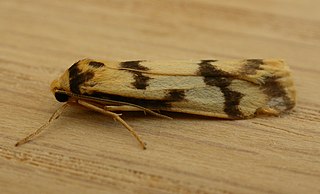Related Research Articles

Tigrioides is a genus of moths in the family Erebidae. The genus was erected by Arthur Gardiner Butler in 1877.

Pusia is a genus of sea snails, marine gastropod mollusks in the family Costellariidae.
Gagrella is a large genus of harvestmen in the family Sclerosomatidae from Asia.

Autosticha is a genus of gelechioid moths. It belongs to the subfamily Autostichinae, which is either placed in the concealer moth family (Oecophoridae), or in an expanded Autostichidae. It is the type genus of its subfamily. Originally, this genus was named Automola, but this name properly refers to a fly genus in family Richardiidae.
Danielithosia is a genus of tiger moths in the family Erebidae.

Hemilophini is a tribe of longhorn beetles of the subfamily Lamiinae.
Gagarinia is a genus of longhorn beetles of the subfamily Lamiinae, containing the following species:
Autosticha aureolata is a moth in the family Autostichidae. It was described by Edward Meyrick in 1908. It is found in Sri Lanka.
Gagarinia borgmeieri is a species of beetle in the family Cerambycidae. It was described by Bondar in 1938. It is known from French Guiana and Brazil.
Gagarinia melasma is a species of beetle in the family Cerambycidae. It was described by Galileo and Martins in 2004. It is known from Bolivia.
Gagarinia mniszechii is a species of beetle in the family Cerambycidae. It was described by Chabrillac in 1857. It is known from Brazil.
Acroperus is a genus of crustaceans in the family Chydoridae.
References
- ↑ BioLib.cz - Gagarinia aureolata. Retrieved on 8 September 2014.